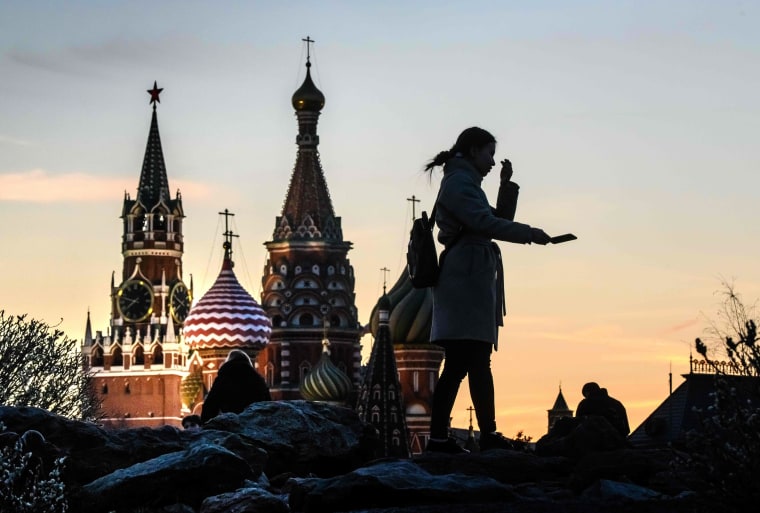Russian media and its proxies wasted no time Friday attacking special counsel Robert Mueller’s report, repeating President Donald Trump and Attorney General William Barr’s “no collusion” lines and reveling in what they said was a “meltdown” by the U.S. media and Democrats who were “out for blood.”
More than 60 headlines for stories on the Mueller report ran across Moscow-linked media organizations, mostly on the state-funded, English-language Russia Today and Sputnik News websites in recent days. A handful of stories also ran on TASS, the Russian state wire service, as well as two websites, Russia Insider and SouthFront, known for carrying Kremlin talking points.
The Mueller report laid out in detail Russia’s multipronged and yearslong efforts to subvert the 2016 election, though it didn’t mention RT and Sputnik by name.
But the organizations were declared part of “Russia’s state-run propaganda machine” in the 2017 Intelligence Community assessment of Russian election interference, which, along with “a network of quasi-government trolls ... contributed to the influence campaign by serving as a platform for Kremlin messaging.”
Their dismissive spin began even before the Mueller report was released on Thursday.
“Don't Read the Report You Already Made Up Your Mind,” read one headline on SputnikNews.
“It is America that is looking forward to the report’s release, but we aren’t,” Dmitry Peskov, press secretary for Russian President Vladimir Putin, told TASS. “We have more interesting and important things to do."
But Russian media and its personalities did take a keen interest in the report once it was released. Ignoring the 448 pages that included contacts, meetings and communications between Trump associates and various Russians, the flood of headlines declared that the Mueller report was a “hoax and a farce” that had found “no evidence” and “no collusion” to support the “unsubstantiated” “Russiagate” and contained “nothing new.”
“US Attorney General Barr Says Trump is CLEARED, NO COLLUSION With Russia,” declared SputnikNews.
“Game over,” headlined Southfront, repeating Trump’s “Game of Thrones” tweet.
“An empire of bulls---” claimed the Moscow-based Russia Inside in a story posted three hours after Trump himself used the epithet in a tweet.
“Time to move on,” RT anchor Scottie Nell Hughes said after the report’s release.
Unlike some notable Russian disinformation efforts, the stories didn’t concoct wild tales or elaborate conspiracy theories. They didn’t need to.
“Barr gave a summary of the report and gave his take yesterday which, in my mind, on obstruction, doesn’t match what Mueller said,” Clint Watts, a fellow at the Foreign Policy Research Institute and an NBC News contributor, said. “If you have an American official who isn’t telling the truth, it arms Russia or any adversary with something beneficial to them.”
Mixed in with the headlines was also coverage and concern for the fate of Julian Assange, the WikiLeaks founder who was arrested last week after spending almost seven years in the Ecuadorian Embassy in London to avoid extradition to the U.S. Assange was a subject of the Mueller report for his organization’s publication of Russia-hacked Democratic National Committee emails before the 2016 election.
Russian outlets have broadly supported Assange.
“Let’s hear out Assange?” asked one RT headline. Another RT anchor retweeted a story questioning a story about Assange smearing feces on the Ecuadorian Embassy wall.
“WATCH: Very Funny Video Ridiculing the Assange Travesty,” encouraged Russia-Insider, directing viewers to a self-described satire video.
Watts noted that Mueller’s report touched on former DNC staffer Seth Rich, who became the source of a baseless conspiracy theory after he was killed in Washington in 2016. His murder, which police attributed to an attempted robbery, led to speculation on the far right and political fringes that Rich had leaked the DNC emails released by WikiLeaks.
Assange later made remarks that some interpreted as implying that Rich was a source for WikiLeaks.
“Assange knew it was bogus,” Watts said. “Russia supported that narrative. They need to keep supporting it to the end and never admit to lying or falsehood.”
“They’ll always back Assange,” he added. “They’ll always say he’s a victim of U.S. suppressing journalism and free speech.”

